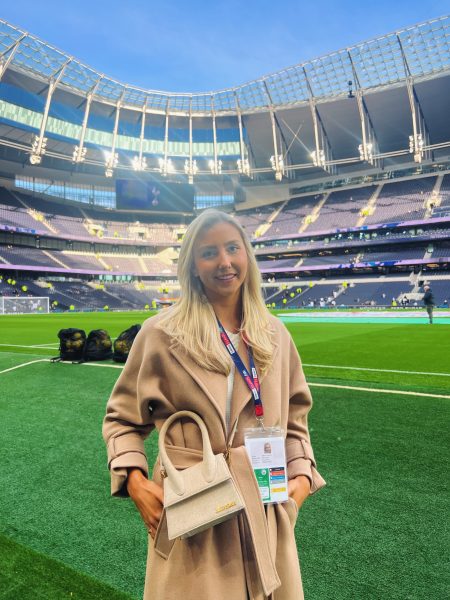
‘Numbers of female sports journalists shouldn’t be just a quota’ say industry panellists at NCTJ event to champion women in sports journalism
Breaking down barriers to support gender equality in sports journalism was the subject of a panel discussion hosted by the NCTJ to mark International Women’s Day.

Panellists Ellen McCarthy, Sandra Brobbey, Paddy Davitt and Fran Yeoman.
Breaking down barriers to support gender equality in sports journalism was the subject of a panel discussion hosted by the NCTJ to mark International Women’s Day.
Sports journalists from across the industry came together for the virtual discussion today to reflect on how it has never been more important to encourage and inspire women to pursue careers in sport.
The subject of the session reflects the dip in the number of women applying for places on sports journalism courses during the pandemic. In 2021, only seven per cent of those registering for NCTJ-accredited sports journalism courses were women. This has increased to 14 per cent in 2022 – still a long way from the NCTJ’s 25 per cent target.
The panellists, who shared their own experiences of succeeding in the sports sector, were sports reporter Sandra Brobbey from News UK, Paddy Davitt, football editor for Newsquest, Ellen McCarthy, assistant producer at Sky Sports News and Frances Yeoman, programme leader in journalism from Liverpool John Moores University.
The panel was chaired by Laura Adams, head of the NCTJ’s Journalism Skills Academy.

Sports reporter Sandra Brobbey from News UK
Reflecting on the numbers of female sports journalists in the industry, Sandra said: “Bringing in female sports journalists shouldn’t be looked at as a quota, it should just be mainstream.
“It should get to the point where gender isn’t an issue. Women in sport and women’s sports are popular, we just need to have more representation.
“There needs to be more doors open for women to get into the industry, especially for women from low-income backgrounds.”
Ellen added: “Women’s sports are on the up, so why wouldn’t you want to be a part of that? It’s a great time to get involved.
“The more women you have working across sports journalism organisations, that will increase the chances of more female-dedicated sports stories and help reach a more female audience. This will encourage more women to come into the industry.”

Paddy Davitt, football editor for Newsquest
Paddy agreed that the visibility of female role models in sports journalism had a key part to play in encouraging women into the industry, though he said there was more to be done about this in the regional press.
He said: “If you look at TV and radio, you can see the role models in those sectors, but when you contrast it to my sector, it’s like night and day.
“I don’t think you can underestimate the absence of female role models in sports journalism and I think that really needs to change.”

Fran Yeoman, programme leader in journalism at Liverpool John Moores University
Fran added: “I don’t think it should necessarily be presumed that female sports journalists will be covering women’s sports, important though that is. I think that’s really important because people want equal coverage of women’s sport.
“Visibility is, of course, important, but you have to think about people in decision-making culture-establishing roles. Those roles need to be gender equal too.”
When discussing the barriers that women face when entering or deciding to pursue a career in sports journalism, Sandra said that money could play a huge factor.
She said: “It’s also an economical issue. You might have aspiring reporters from low-income backgrounds seeing those trainee salaries and then questioning whether it’s a job for them. They will think about whether they want to take that job or another job that’s higher paid.”
Ellen added: “Fortunately, from my point of view, I haven’t experienced any sort of barriers and I have had lots of opportunities, and I do think it’s important to take any opportunity.
“One thing to recognise is I work shifts and it’s very unsociable hours. I’m thinking of women who become parents – working shifts and dealing with childcare can be difficult.”
Paddy agreed with those challenges and reflected on his own difficulties of hiring female sports reporters. He said: “As we all know, it isn’t a 9am to 5pm Monday to Friday job. With a transfer window, you could be working at any point of the day, and trying to balance work and life can be very challenging at times.
“There are barriers no doubt about it. The numbers of women I see in press boxes aren’t representative of women and girls interested in football.”
Fran described the work they do at Liverpool John Moores University to foster an inclusive environment and said: “Our role is about supporting women once they are here, not just about getting them here in the first place.
“We deal with all types of women’s and men’s sport, not just football, and we monitor the gender balance of our interviewees. We bring in guest speakers who are women from different backgrounds and finally we listen to the students and don’t assume what the female sports journalism students want.”

Ellen McCarthy, assistant producer at Sky Sports News
Giving advice on how to get into sports journalism, Ellen said: “Research the industry and the qualifications you need. Make yourself stand out and expand your knowledge across all sports. Give yourself the best possible chance to be able to take any opportunity.”
Fran added: “If you get through the door, make sure you support as you climb. Open the door to more women. You need to bring them with you and you will be really glad that you did.”
The recording of the panel discussion can be viewed here.
As part of the activities to mark International Women’s Day, the NCTJ’s Journalism Skills Academy is hosting a special ‘lunch and learn’ training session for aspiring female leaders. The session will focus on developing confidence and trusting instincts in a leadership role.
This session will be held on Friday 10 March. To sign up, click here.

